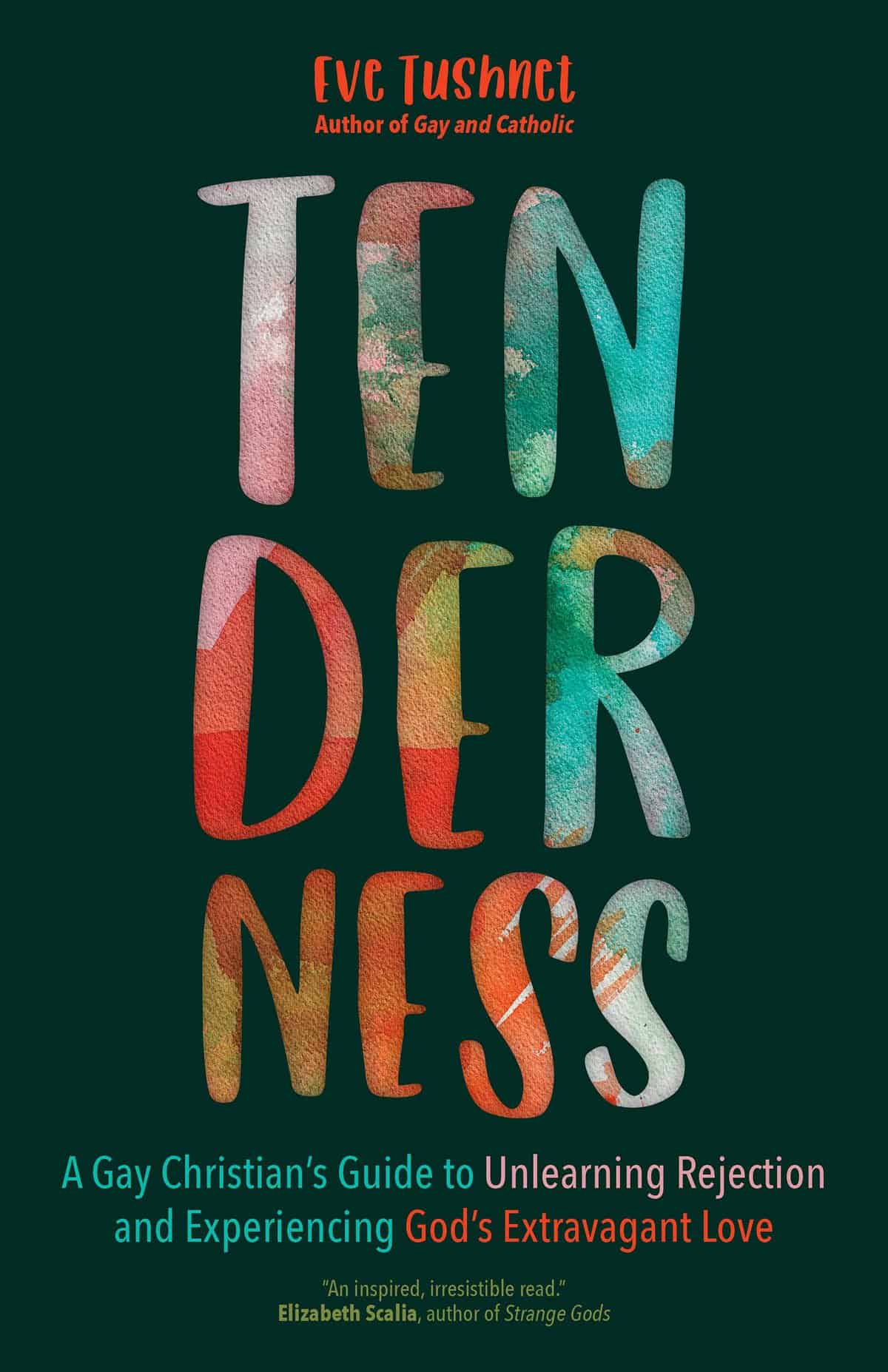 We spoke with Eve Tushnet about her new book, Tenderness: A Gay Christian’s Guide to Unlearning Rejection and Experiencing God’s Extravagant Love (Ave Maria Press). Written for gay Christians who want to observe a traditional sexual ethic, the book carries a broader invitation to spiritual healing for gay people of all theological persuasions. It also imparts a deeper (both stinging and loving) message to the faith community at large, the people and cultures responsible for the hurt and trauma inflicted on God’s gay children. As such, Tushnet calls not just for care and concern but for a fundamental rethinking of what love, discipleship, and justice look like for all God’s people as modeled by Christ’s body.
We spoke with Eve Tushnet about her new book, Tenderness: A Gay Christian’s Guide to Unlearning Rejection and Experiencing God’s Extravagant Love (Ave Maria Press). Written for gay Christians who want to observe a traditional sexual ethic, the book carries a broader invitation to spiritual healing for gay people of all theological persuasions. It also imparts a deeper (both stinging and loving) message to the faith community at large, the people and cultures responsible for the hurt and trauma inflicted on God’s gay children. As such, Tushnet calls not just for care and concern but for a fundamental rethinking of what love, discipleship, and justice look like for all God’s people as modeled by Christ’s body.
Below you’ll find our conversation, as well as an excerpt from Tushnet’s book.
You do a painful inventory of the damage done to sexual minorities by the church. What will it take for the church to move from one of the most dangerous places for gay people to one of the safest?
I think the biggest things are underlying attitude shifts. Those will produce specific changes, and I have opinions about what those changes can and should be, but the soil needs to be plowed before we can know which seeds will bring fruit. If most people in the churches approach gay (etc.) people with an attitude of interest and trust, rather than suspicion, that will help us to articulate our needs and develop any insights we may be able to bring. In a sense, the central problem is trust. Trusting that gay people have an understanding of our own experience which can offer insights to the rest of the people of God; and trusting that Scripture and church tradition have more to say to us than “no.” There are “yes”es there which we can rediscover, because God knows the longings of our hearts better than our church communities do—whether those communities are “conservative” or “progressive.”
All of that is pretty abstract, but I think the chapter you’ve excerpted here gives you enough of the harrowing specifics to avoid! In general, when I’ve spoken to gay Christians who have continued to turn to Christ and his Bride in spite of often terrible mistreatment by fellow Christians, what I’ve learned is that one or two people can make a huge difference. The friend who immediately pledges love and support when you come out; the priest who receives your account of your experience with openness and gratitude, encouraging you to find the path God wants for you, instead of the path your parents wanted; the people who mourn for the ways you were harmed and who trust that God has a joyful morning for you after your nights of weeping—the more of these people somebody meets, the more likely it is that they will trust that God’s love is like those people’s love, only infinitely more.
In your view, what have the culture wars over sexuality (and gender) cost the Body of Christ in terms of its health, witness?
I honestly don’t think I’m the right person to answer this question. I know my own participation in culture-war clashes distanced me from the people who were being harmed by them. The people who were coming out (especially those who were coming out to themselves) during the political conflicts over gay rights, including gay marriage, are the best people to describe what happened. They have told me that the Christians around them treated gay people as outsiders, enemies, objects of hatred; they are still struggling with the anger, hurt, mistrust, and shame which Christians caused in those years.
You embrace—and invite others to—the beauty and meaning you find in the Catholic sexual ethic, but you also talk about how important it is for gay Christians to cultivate friendships with gay Christians who come to different conclusions and who are part of different churches/denominations. How do you personally navigate friendships across deep difference in theology, and what are some gifts that those friendships have brought you?
It’s complicated! I’m sure it’s complicated for the friends who don’t share my beliefs to be friends with me, as well. I doubt I always navigate these friendships in the best possible way. Sometimes I probably press my own beliefs when I should just listen; sometimes I probably bite my tongue when the other person genuinely wants to know what I think. Most long-term relationships are built more on forgiveness than on correct behavior.
I hope these friendships have helped me see how individual each path to God is—how mysterious God’s love, how willingly God showers intimacy with himself and blessing on people during and even through experiences I don’t believe to be fully in harmony with God’s way. Sometimes I think nowadays it’s easier for us to recognize this generosity of God when it comes to “metaphysical” questions (few of us now think that God only reveals himself within our own particular church, or only to Christians), and we struggle to recognize God’s grace working in situations where the divide is moral. But that’s the fault of our own hyperfocus on morality! In truth, God works with anything we give; God is at work in every love.
I’ll also say, I don’t think I needed this (to the extent that we can ever know what we need!), but friendships with gay people who don’t share their church’s sexual ethic can help some gay people get past the deep-rooted idea that God’s love is conditional. If you love someone who doesn’t share your beliefs—if you find them lovable—then it becomes easier to believe that God can love you no matter what you end up believing or doing. This journey toward freedom is also a journey toward a deeper experience of God’s love.
 Excerpt: “The Gay Christian Drinking Game”
Excerpt: “The Gay Christian Drinking Game”
by Eve Tushnet
I am a recovering alcoholic; by God’s unexpected mercy I’ve been freed from the destructive habits that go along with alcoholism. But I have not been freed from the fun habits—like thinking of everything in terms of a drinking game.
The following game is composed entirely of true stories: things that really happened to gay Christians I know, people who accepted their church’s sexual ethic and sought to be obedient to it. Almost all of them happened to several people. Some of them happened to a majority of us.
Obviously, don’t actually, you know, play this as a drinking game. But as you knock back your shots of grape juice, or whatever, you may still find your vision blurring as a distorted and monstrous figure slowly appears, flickering on the edges of sight: the hallucinated version of God, which is one symptom of long-term addiction to American Christianity.
The good news is, that god isn’t real.
The bad news is, I bet a lot of you still see him when you close your eyes.
Take a drink if . . .
- the only time you ever heard the word “gay” from the pulpit, growing up, it was about how the gays are destroying America. If you want to get wrecked before the game really even gets going, do a shot for every single sermon you heard that set up gay people as enemies of the faith.
- the only advice you got about your future as a gay person in the Church was, “Don’t worry, it’s probably just a phase.”
- you’ve made homophobic jokes, or laughed at other people’s, so that nobody would guess.
- you’ve developed a physical ailment, a fun stress-related thing like eczema or ulcers, maybe insomnia or panic attacks, which mysteriously started to get better when you finally gave up and came out.
- some of the people you care about most stopped speaking to you when they found out you were gay.
- you’ve desperately prayed to become straight, night after night, often in tears—and then after years of this, when you finally come out, straight Christians tell you that God will heal you if you just trust him.
- you’ve tried reparative therapy, healing prayer, reconciling with your father, punching a pillow, growing your hair long (for the ladies) or learning to throw a football (for the dudes), spending a weekend in the woods with other hot, young, confused, same-sex attracted guys (boy, that didn’t go the way you intended), getting in touch with your feelings, learning to ignore your feelings, telling your most shameful personal secrets to an auditorium full of people, going on dates with the opposite sex and frankly leading them on in ways you’re now ashamed of; you’ve tried 12-step recovery from homosexuality, exorcism (twice), and a forty-day juice fast; and when you tell your straight Christian friend that you’re still super gay, she says, “Have you read Leanne Payne? I think her approach could really work for you.”
- you get panic attacks on the way to church, but you go anyway; you feel free and safe at Pride parades and wonder if that should make you ashamed.
- you’ve cursed out Jesus and then told him, “I will always love you. But I know you don’t want me.”
Take a drink if . . .
- you lost a job or ministry position because you came out, or were outed by others. Drain your drink if you were told that you weren’t a good fit for the position because your sexuality made you a threat to children.
- you aren’t sure if you should drink for the previous item. Everybody said that your orientation was no problem, but then there was a long delay before you heard back from them that “some- thing came up” and they were rescinding the job offer, and you remember how their faces looked when you said “gay.” When this kind of thing happens more than once, not with the same details but the same general outline, you start to feel as if you’re in a horror movie where everybody you know and trust might be a shape-shifting alien—or maybe you’re just paranoid, and you can’t even trust yourself.
- you were thrown out of your home because you came out, or were outed by others.
- you weren’t thrown out of your house, because your parents tried to confine you to it. They took away your phone, and your computer if you had one. They only let you leave the house to go to school and church (and meetings with the Christian therapist who promised you confidentiality, then told your parents everything you said to her). They took your door off its hinges. You always thought this was such extreme behavior that nobody else could have experienced it, so you never bothered to mention it; decades later you discovered that scores of other gay teens were treated the same way.
- when you came out of the closet, Christians gossiped about you and started avoiding your family.
- you confided in someone about having experienced sexual abuse, and they told you, “Oh, that must be why you’re gay.”
- you haven’t actually been abused but your counselor, pastor, or therapist assumed that you have, because you’re gay. Extra drink if they tried to convince you that you were just repressing the memories.
- you confided in someone about having been in an abusive same-sex relationship as an adult, and they told you, “Well, I don’t know what you expect from a sinful relationship.”
- you wondered if maybe that was right, since part of the reason your relationship turned abusive (on your side, or your partner’s side, or both) was because you two were closeted and had nobody to talk to about your problems. A relationship that secretly turned sexual then secretly turned jealous or obsessive and then, still secretly, turned violent. You had nobody to tell you which specific behaviors were selfish, manipulative, or cruel—all gay relationships were treated as an undifferentiated mass of sin.
- and then, when you got out of that awful relationship and were confused, guilt-ridden, and mourning, you had nobody to talk to about that either.
- you had no guidance at church, at home, or at school, so the only place you could learn what it meant to be gay was from porn. Or the sketchy guys you met through the Internet. Or the rapists you met through the Internet. Or, if you were lucky, terrible fanfiction called things like “Draco Potter-Malfoy and the Bedchamber of Secrets.”
- you were punished by your Christian college because you hugged a dude. Like, not your boyfriend, even, just a guy friend. And then straight Christians told you to stop defining yourself by your sexuality!
- you’ve received spiritual counsel or therapy that assumed that chastity was your biggest struggle and same-sex attraction was the center of your spiritual life. (And then straight Christians told you to stop defining yourself by your sexuality.)
- other people assumed you were having sex with your best friend / housemate / second cousin once removed, and then blamed you for “giving scandal” by making them think about all the hot gay sex you weren’t actually having.
- as soon as they found out you’re gay, your pastor or other spiritual authority started to watch your friendships like the Stasi. If you had one same-sex friendship that did turn out badly, these mentors redoubled their suspicion of all your same-sex friendships. They advised you to keep away from anybody of the same sex who seemed to like you too much. They were shocked when this led you to bitterness, despair, or rejection of the Christian sexual ethic.
(I know these last four are basically all the same item, but it’s ridiculous how everything I do is viewed as inherently sexual as soon as people find out I’m gay. It’s as if gay people are an alien species from some Star Trek–themed porno, whose every limb is a sex organ.)
- your emotional openness and vulnerability with same-sex friends were called “neediness,” “being enmeshed,” or “codependence.” Your traumatized guardedness and inability to trust were treated as evidence of spiritual maturity.
- you’ve been assaulted, threatened, or verbally harassed because you “look gay” or were being suspiciously intimate with someone of the same sex.
- your dad threatened to beat you up for being gay. Or really did it.
- your suicide attempt was the only thing that could finally make you admit you were gay.
Secular or progressive communities can provide their own items for this drinking game. You’ll notice that these next ones are a lot less violent than some of the ones above, although over time they can also wear down a person’s self-respect and trust in God and other people.
So hey, take a drink if . . .
- you’ve been called “self-hating” because of your faith, by people who think they’re doing you a favor. “Poor thing, you have Stockholm Syndrome.” “You think you can get them to treat you better by being celibate, but they still hate you. Sad!”
- you’ve been told that your deepest friendships—forms of love that shape your life and may have saved it—are “just friendship,” “not real love,” or otherwise inferior to sexual relationships.
- you’ve shared some of your deepest and most harrowing spiritual experiences—the places where you’ve experienced God’s mercy in the teeth of despair and shame—and the person you were talking to acted like you were crazy or foolish for making such a big deal about a little thing like being gay.
- you’ve been told, “Oh, I get it, you’re asexual.” I, uh, am not asexual, as literally all of my confessors know. Most people who accept celibacy for the sake of the kingdom of God aren’t. It isn’t that we find sex boring; it’s that we believe God is asking us to sacrifice its pleasures for a joy immeasurably greater.
So here we are, gazing out over the wreckage of our drinking game: a tabletop and floor covered with sticky empty Solo cups, in ranks like tombstones. Each item I’ve listed above represents thousands upon thousands of lives distorted by shame and despair, by false conceptions of God. Each item represents thousands upon thousands of churches where the best that gay people can hope for is total silence about our futures.
It doesn’t have to be this way.
This excerpt from Tenderness: A Gay Christian’s Guide to Unlearning Rejection and Experiencing God’s Extravagant Love by Eve Tushnet is reprinted with the permission of the publisher, Ave Maria Press.


